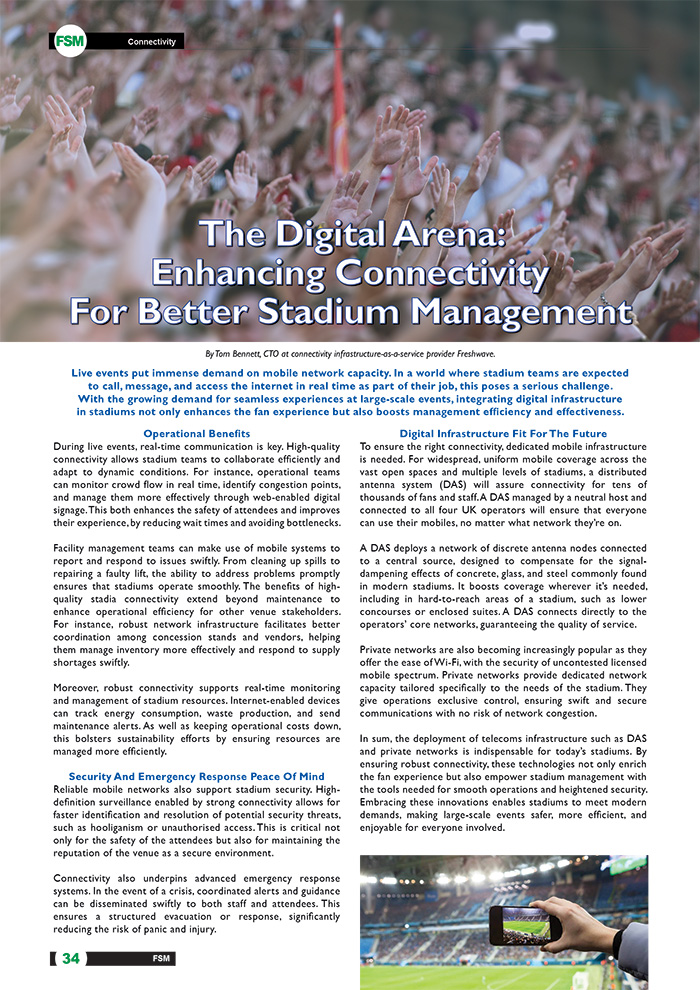The Digital Arena:
Enhancing Connectivity For Better Stadium Management

Live events put immense demand on mobile network capacity. In a world where stadium teams are expected to call, message, and access the internet in real time as part of their job, this poses a serious challenge. With the growing demand for seamless experiences at large‑scale events, integrating digital infrastructure in stadiums not only enhances the fan experience but also boosts management efficiency and effectiveness.
Operational Benefits

During live events, real‑time communication is key. High‑quality connectivity allows stadium teams to collaborate efficiently and adapt to dynamic conditions. For instance, operational teams can monitor crowd flow in real time, identify congestion points, and manage them more effectively through web‑enabled digital signage. This both enhances the safety of attendees and improves their experience, by reducing wait times and avoiding bottlenecks.
Facility management teams can make use of mobile systems to report and respond to issues swiftly. From cleaning up spills to repairing a faulty lift, the ability to address problems promptly ensures that stadiums operate smoothly. The benefits of high‑quality stadia connectivity extend beyond maintenance to enhance operational efficiency for other venue stakeholders. For instance, robust network infrastructure facilitates better coordination among concession stands and vendors, helping them manage inventory more effectively and respond to supply shortages swiftly.
Moreover, robust connectivity supports real‑time monitoring and management of stadium resources. Internet‑enabled devices can track energy consumption, waste production, and send maintenance alerts. As well as keeping operational costs down, this bolsters sustainability efforts by ensuring resources are managed more efficiently.
Security And Emergency Response Peace Of Mind
Reliable mobile networks also support stadium security. High‑definition surveillance enabled by strong connectivity allows for faster identification and resolution of potential security threats, such as hooliganism or unauthorised access. This is critical not only for the safety of the attendees but also for maintaining the reputation of the venue as a secure environment.
Connectivity also underpins advanced emergency response systems. In the event of a crisis, coordinated alerts and guidance can be disseminated swiftly to both staff and attendees. This ensures a structured evacuation or response, significantly reducing the risk of panic and injury.
Digital Infrastructure Fit For The Future

To ensure the right connectivity, dedicated mobile infrastructure is needed. For widespread, uniform mobile coverage across the vast open spaces and multiple levels of stadiums, a distributed antenna system (DAS) will assure connectivity for tens of thousands of fans and staff. A DAS managed by a neutral host and connected to all four UK operators will ensure that everyone can use their mobiles, no matter what network they’re on.
A DAS deploys a network of discrete antenna nodes connected to a central source, designed to compensate for the signal‑dampening effects of concrete, glass, and steel commonly found in modern stadiums. It boosts coverage wherever it’s needed, including in hard‑to‑reach areas of a stadium, such as lower concourses or enclosed suites. A DAS connects directly to the operators’ core networks, guaranteeing the quality of service.
Private networks are also becoming increasingly popular as they offer the ease of Wi‑Fi, with the security of uncontested licensed mobile spectrum. Private networks provide dedicated network capacity tailored specifically to the needs of the stadium. They give operations exclusive control, ensuring swift and secure communications with no risk of network congestion.
In sum, the deployment of telecoms infrastructure such as DAS and private networks is indispensable for today’s stadiums. By ensuring robust connectivity, these technologies not only enrich the fan experience but also empower stadium management with the tools needed for smooth operations and heightened security. Embracing these innovations enables stadiums to meet modern demands, making large‑scale events safer, more efficient, and enjoyable for everyone involved.












































